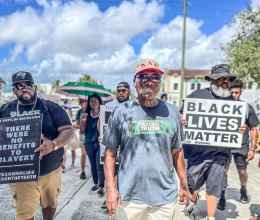Lazaro Rodriguez, a 58-year-old Latino man living in North Miami with his wife and son, was arrested by Miami-Dade police the day before his 55th birthday and charged with two misdemeanor counts of resisting an officer without violence and a felony of threatening a public servant. Because he could not afford an attorney, the court appointed a public defender for Rodriguez. He was a Spanish speaker without a background in the law, who was relying on his public defender as was his right.
His public defender was subsequently removed by Judge Hague after the prosecution dropped the felony charge and one misdemeanor charge, then decided not pursue jail time. Under Florida law, the prosecution’s decision not to pursue jail time allowed the judge to remove Rodriguez’s public defender. Judge Hague removed the public defender without meaningfully evaluating the circumstances of Rodriguez’s case or the potential prejudice that Rodriguez might suffer from the removal of counsel. His decision gave the prosecution a distinct advantage after Rodriguez’s public defender was removed.
Judge Hague’s actions effectively allowed the prosecutors to decide whether an indigent defendant charged with a misdemeanor would have legal counsel. Rodriguez was convicted of the remaining misdemeanor. After conviction and still without a public defender at his side, Judge Hague failed to advise Rodriguez of his right to appeal. The time for such an appeal has now run out under Florida law, further abrogating justice. This is a clear case of wealth-based injustice that feeds the assembly line of convictions. Rodriguez’s Constitutional rights were violated, including his Fourteenth Amendment right to due process and the equal protection of the laws, as well as his Sixth and Fourteenth Amendment rights to counsel. Rodriguez’s uncounseled conviction and sentence is a fate that only befalls the indigent, and it is unconstitutional. The ACLU and the ACLU of Florida are suing.







